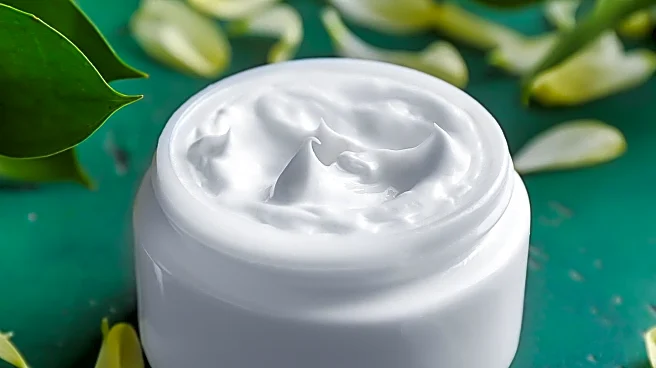What's Happening?
Dermatologists are recommending over-the-counter anti-itch creams that focus on strengthening the skin barrier to alleviate discomfort. Dr. Anar Mikailov, a Massachusetts-based board-certified dermatologist, highlights a new cream containing aluminum
acetate, shea butter, and ceramides, which is effective for various types of itch. These creams, including products from CeraVe, are designed to improve skin barrier function, reduce inflammation, and soothe irritation. CeraVe's cream, which contains three essential ceramides, is particularly recommended for eczema patients as it strengthens the skin barrier, making it less reactive to irritants. The Dermeleve cream also includes hyaluronic acid and strontium mineral salt, which help draw moisture into the skin and suppress sensory irritation.
Why It's Important?
The emphasis on barrier repair creams is significant as they offer a steroid-free option for managing itchy skin, which is crucial for individuals with sensitive skin conditions like eczema. By focusing on strengthening the skin barrier, these creams provide a long-term solution to reduce skin reactivity and inflammation. This approach aligns with dermatologists' advice to prioritize daily moisturizing to maintain skin health. The availability of effective OTC options expands access to skin care solutions, potentially reducing the need for prescription medications and minimizing the risk of side effects associated with steroid use.
What's Next?
As awareness of the benefits of barrier repair creams grows, consumers may increasingly seek products that offer both immediate relief and long-term skin health benefits. Dermatologists are likely to continue advocating for products that focus on skin barrier strengthening, potentially influencing the development of new formulations in the skincare industry. Additionally, further research into ingredients like strontium mineral salt could lead to more targeted treatments for sensory irritation and itch relief.
Beyond the Headlines
The shift towards barrier repair creams reflects a broader trend in dermatology that prioritizes skin health and preventative care over temporary symptom relief. This approach may encourage consumers to adopt more comprehensive skincare routines that focus on maintaining skin integrity and resilience. The ethical implications of reducing reliance on steroid-based treatments are also noteworthy, as it aligns with a growing demand for safer, more sustainable skincare solutions.















